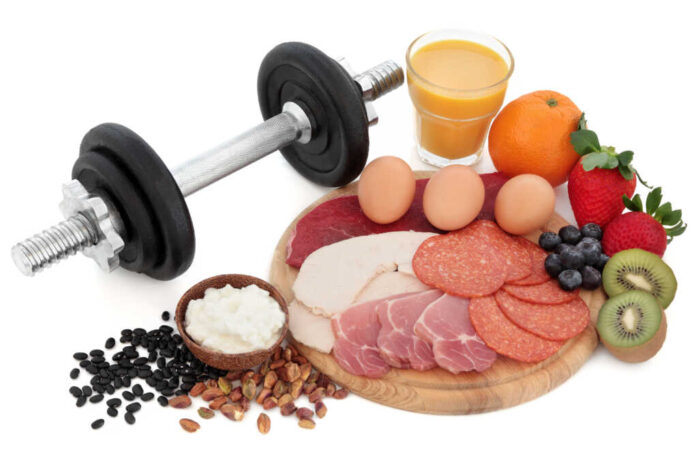
Building muscle and getting a lean look depends on two things: breaking down muscle during workouts and refueling with good food afterward. These steps work together, so skipping one will slow down your progress.
Here are 16 top foods for building and repairing muscles.
- Eggs
Whole eggs used to be criticized for raising cholesterol, but they’re actually good for you in moderation. One whole egg has over six grams of protein, which is helpful. Recent studies show that whole eggs might be better for reducing body fat than just egg whites. Eggs also have important nutrients like B vitamins and choline, which give you energy.
2. Peanuts
Peanuts provide protein, magnesium (essential for muscle contraction), B-complex vitamins (needed for energy production), and antioxidants (aiding muscle recovery post-exercise).
3. Salmon
Salmon is a fantastic protein source rich in beneficial Omega-3 fatty acids, providing 25 grams of protein per 3.5 ounces. Try baking it with olive oil and a squeeze of fresh lemon for a delicious muscle-building meal.
4. Chicken Breast
Chicken breasts are popular for muscle building due to their high protein content. A 3-ounce (85-gram) serving provides about 26.7 grams of quality protein. Additionally, chicken breasts contain ample amounts of B vitamins such as niacin and B6, which support proper body function during physical activity essential for muscle growth.
Research from 2018 suggests that consuming high-protein foods like chicken after exercise may aid in fat loss while enhancing muscle mass and strength.
5. Quinoa
Quinoa is a complete plant protein and contains insulin-like growth factor (IGF-1), essential for muscle growth. It’s an excellent complex carbohydrate to combine with proteins like chicken, beef, or salmon for optimal muscle building.
6. Soybeans
Soybeans are well-regarded legumes and offer a superb plant-based protein option. They possess all nine essential amino acids, rendering them a complete protein source. Soy protein powders are widely utilized in high-quality protein shakes, especially among athletes.
7. Pumpkin seeds
Similar to hemp seeds, pumpkin seeds are a complete protein source, providing all essential amino acids necessary for muscle building. With 5 grams of protein per 1 ounce, they are also rich in antioxidants.
8. Greek Yogurt
Dairy products contain a blend of fast-digesting whey protein and slow-digesting casein protein, which is good for muscle growth.
Greek yogurt stands out with about twice the protein content of regular yogurt. Having Greek yogurt as a snack, especially after a workout or before bed, can be particularly helpful because of its mix of fast and slow-digesting proteins.
9. Cottage Cheese
A cup (226 grams) of low-fat cottage cheese contains 28 grams of protein, including a significant amount of the crucial muscle-building amino acid, leucine.
Just like other dairy items, cottage cheese comes in different fat variations. Creamed cottage cheese, which has more calories, is an example of a high-fat version.
10. Lentils
Lentils can be a valuable tool for building muscle mass. A cup of cooked lentils offers 18 grams of protein and 40 grams of slow-digesting, high-quality carbohydrates. They’re also budget-friendly and have a long shelf life. Cooking them takes just 10 minutes, and you can incorporate them into dishes like mixed with brown rice, sprinkled over salads, or enjoyed as a standalone side dish.
11. Milk
Skimmed or 3.25% fat milk provides 8 grams of protein per 8 ounces, while high protein milk offers 13 grams of protein per 8 ounces. For those who can tolerate it, milk is a nutritious option to increase protein intake and stay hydrated post-exercise.
12. Turkey
Turkey, a white meat, is high in protein and low in fat. It’s also packed with B-complex vitamins, particularly niacin, crucial for cell energy production. Additionally, turkey is abundant in potassium and magnesium, which can enhance physical performance by supporting muscular contraction.
13. Chickpeas
Chickpeas, also called garbanzo beans, offer a mix of carbohydrates and protein. In a 1-cup (164-gram) serving of canned chickpeas, you’ll find approximately 15 grams of protein and 45 grams of carbs, including 13 grams of fiber.
14. Almonds
An ounce (28 grams) of roasted almonds offers 6 grams of protein and significant doses of vitamin E, magnesium, and phosphorus. Like peanuts, almonds should be eaten in moderation because they are calorie-dense. Half a cup of blanched almonds contains over 400 calories.
15. Hemp Seeds
Considered a highly nutritious superfood, hemp seeds stand out as an exceptional protein source, providing 32 grams per 3.5-ounce serving. Unlike many other plant protein sources, hemp seeds boast a complete amino acid profile along with plenty of healthy fats.
16. Tofu
Tofu, a plant-based food derived from soybeans, is abundant in protein, aiding in muscle growth. Its high potassium and phosphorus content can enhance stamina and performance during workouts.



















